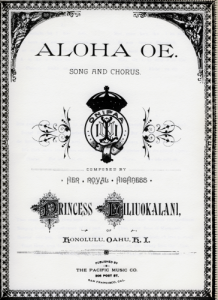Hawaiian: Three Things You Should Know
By Sarah-Claire Jordan
 Many of us may not think of Hawaii as anything other than one of the last states to become part of our country. It has always had its own distinct culture, however, due to many reasons. Hawaii is found way out almost in the middle of the Pacific Ocean, isolating it quite a bit from the rest of the United States. On top of that, it didn’t become a state until 1959, giving it less time to assimilate to American culture.
Many of us may not think of Hawaii as anything other than one of the last states to become part of our country. It has always had its own distinct culture, however, due to many reasons. Hawaii is found way out almost in the middle of the Pacific Ocean, isolating it quite a bit from the rest of the United States. On top of that, it didn’t become a state until 1959, giving it less time to assimilate to American culture.
Hawaii may be the only state with its own language. There are several states where Spanish was the original language of the land, but through European colonization. Hawaii, on the other hand, was never colonized, though it did have to deal with greater nations invading and making demands. Otherwise, however, Hawaii has remained true to its linguistic roots since the first Polynesians came over to settle the islands around 1 CE, followed by Tahitian settlers in 1200 CE. Here are three other things you should know about the Hawaiian language:
1. Hawaiian was practically banned at one point
After James Cook of Great Britain was the first European made contact with Hawaii in 1778, decades of British influence followed. This included many missionaries making trips and teaching English to the native Hawaiians, as well as them learning Hawaiian. The monarchy of Hawaii long realized the importance of learning and using English as a way to stay in contact with Great Britain and the U.S. However, in 1896, an act was passed that required all government-run schools to teach only in English, and to punish the use of Hawaiian by students. Eventually there was a bit of a revival of the language, with immersion schools today as well as newspapers and other publications, but still less than 1% of the population speak Hawaiian today.
2. Many Hawaiian words have multiple meanings
Hawaiian has a wonderful poetic history that includes chants, songs, poems, and stories. Like many indigenous cultures, there are many myths and legends that are part of Hawaiian culture. On top of this, it is believed by many that Hawaiian has more words with more than one meaning than any other language. This tendency towards double, or multiple, meanings is called “kaona”, and makes the process of naming a child, building, street, or anything else a more difficult process. A name that might have a totally innocent meaning could have other more provocative meanings, and so names must be chosen with care so as to avoid offending anyone.
3. Many English words are of Hawaiian origin
“Aloha”, “luau”, “lei”, and others are words that quickly made their way into the American English lexicon once contact was established between the U.S. and Hawaii. There are words we use that we may not realize are originally Hawaiian, like “kahuna”, as in “big kahuna”. “Kahuna” is the Hawaiian word for shaman or priest. Another interesting word we use now that probably don’t realize is from Hawaii is the word “wiki”, which means fast. Wikipedia is probably the most obvious use of this word, making it a portmanteau of “wiki/fast” and “encyclopedia”.
For an overview of our translation expertise, visit our legal translation service page.
Category: Foreign Language








